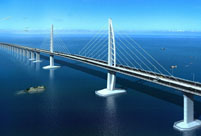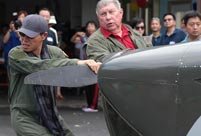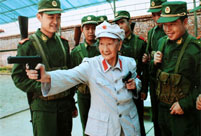

TOKYO, Nov. 11 -- Japanese Prime Minister Shinzo Abe and his Indian counterpart Narendra Modi concluded talks on Friday on a wide range of collaborative bilateral issues, with the signing of a contentious civilian nuclear pact.
The civilian nuclear pact will allow Japan to export nuclear power technology and military equipment to India, very much in the spotlight.
The move has drawn staunch criticism from some sections of the international community as well as anti-nuclear advocates, as this marks the first time Japan has inked this kind of deal with a country that is not a signatory of the international Nuclear Non-Proliferation Treaty.
The treaty is a key international push aimed at preventing the spread of nuclear weapons and weapons-related technology and making sure such dangerous capabilities do not fall into the hands of terrorists, militant groups or other insurgents.
The treaty, not signed by India, is also central to promoting cooperation in the peaceful use of nuclear energy and to advance the goal of achieving nuclear disarmament and general and complete disarmament.
However, analysts close to the matter have pointed out the fact that there are no guarantees India won't carry out further tests of nuclear explosive devises, and that there is no means for Japan to ensure its technology is not redirected and misused.
India has tested nuclear bombs in the 1970s and 1990s. In May, 1998, for example, India conducted tests on 5 nuclear bombs known as Pokhran-II. The first nuclear test India conducted was in May 1974 and was dubbed "Smiling Buddha."
Non-proliferation issues aside, some observers have also rebuked Friday's pact as there still remains a great deal of concern over the safety standards of Japan's nuclear technology in the wake of the devastating Fukushima disaster in 2011, the multiple meltdowns of which were the worst commercial nuclear disaster to ever occur.
The talks on Friday also saw Abe and Modi discuss India using Japanese Shinkansen bullet train technology for its 500-km railway project that will connect Mumbai and Ahmedabad in western India.
On Saturday, the two leaders will take a Shinkansen bullet train to Kobe in western Japan, and visit a plant of Kawasaki Heavy Industries Ltd., which makes Shinkansen cars.
 Top 10 Chinese tech and engineering marvels
Top 10 Chinese tech and engineering marvels Tom Cruise in Palace Museum
Tom Cruise in Palace Museum Home-made plane completes test flight in Chicago
Home-made plane completes test flight in Chicago The untold stories of women in the Long March
The untold stories of women in the Long March Female soldiers on Frigate Jingzhou
Female soldiers on Frigate Jingzhou Top 10 most beautiful Chinese athletes in Rio
Top 10 most beautiful Chinese athletes in Rio Shenzhen seizes 549 tons of illegally smuggled clothing
Shenzhen seizes 549 tons of illegally smuggled clothing Chinese actor Wang Baoqiang divorces wife, fires manager
Chinese actor Wang Baoqiang divorces wife, fires manager Hangzhou: host city of G20 Summit
Hangzhou: host city of G20 Summit Top 10 livable Chinese cities
Top 10 livable Chinese cities Top 20 hottest women in the world in 2014
Top 20 hottest women in the world in 2014 Top 10 hardest languages to learn
Top 10 hardest languages to learn China’s Top 10 Unique Bridges, Highways and Roads
China’s Top 10 Unique Bridges, Highways and Roads Beijing’s hutong pub owners face a challenging future
Beijing’s hutong pub owners face a challenging future
 China boy found dead in abandoned well after 100-hour rescue
China boy found dead in abandoned well after 100-hour rescue
 Agents help overseas clients get their hands on cheap Chinese products
Agents help overseas clients get their hands on cheap Chinese products
 Can Trump be a powerful president?
Can Trump be a powerful president?